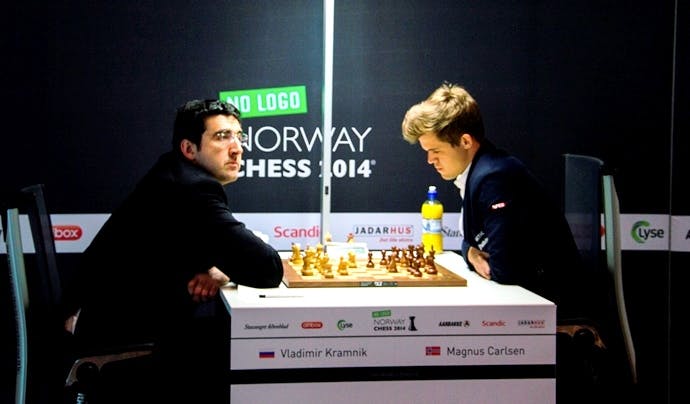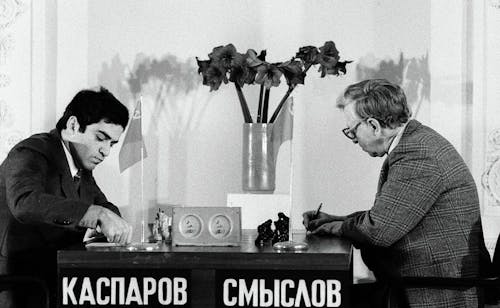Are you sure you want to delete your account?
(This will permanently delete all of your data - purchases, game scores, ratings, etc)
Change your username
Your current username is: guest
Change your account email address
Your current account email is:
Redeem your Fampay code here!
Use your Fampay code to get access to the Play Magnus Plus Membership!

Chess Openings: Who are Your Role Models?
Photo by Even Emberland, Norway Chess, 2014
Good artists copy; great artists steal.
Pablo Picasso
Do you know how to study openings efficiently? From my experience, most club players face many difficulties along the way and end up shooting themselves in the foot.
Here is a typical story:
John heard from a friend that the Najdorf Sicilian is a fascinating weapon for Black, leading to sharp positions. As someone who takes chess seriously, he bought a 500-page book on this opening and promised himself that he would study it from cover to cover. He also praised himself on the purchase: so much value for its price!
At first, he was very enthusiastic, but when he realized that processing 500 pages of sophisticated analysis primarily generated by chess engines is killing all his joy and love for chess, he gave up on the book on page 50. Well, at least he still has the book in his library, and it gives him a warm, fuzzy feeling when he looks at it and dreams that one day he will somehow know all of its contents! This anecdote is similar to the story about people buying gym passes and giving up on their workout routine after just a few sessions.
Let’s give John a helping hand and develop tips on how he could do better next time.
First of all, John probably took on a book that is beyond his current playing strength. Chances are, his main weakness is not that he doesn’t remember 20+ moves of cutting-edge theory in the lines he plays, but something more prosaic, such as not knowing what to aim for in the opening, overlooking tactical shots, or not being familiar with basic endgame positions. The opening encyclopedia could come in handy later, especially if John is not well-versed in working with chess databases. Still, it is counterproductive to delve into it at the early stages of learning a new opening at the club level.
Secondly, to familiarize yourself with an opening, you typically start by looking at a few model games illustrating the key ideas of the opening, followed up by choosing your role model for this particular opening.
Let’s talk in more detail about what makes a good chess role model:
• He should be a proficient player who plays the opening a lot and knows the ins and outs, including standard plans, tricky move orders, and even has his trademark ideas and novelties in it.
• Pay attention to the performance. Does the potential role model score well in this opening? If he plays it a lot only to suffer there, it is probably not a good idea to follow in his footsteps! Also, if he keeps landing in terrible positions out of the opening and then gets away with it due to middlegame and endgame prowess, he is a questionable candidate for the role model spot.
• If we are talking about the initial stages of mastering an opening, there is nothing wrong about learning from the legends of the past. For example, Anatoly Karpov’s style was largely influenced by reading a book with Jose Raul Capablanca’s best games in his childhood. Similarly, Vladimir Kramnik diligently studied Karpov’s games as a kid. One of Magnus Carlsen’s favorite books was a collection of Vladimir Kramnik’s selected games. It is no coincidence that all of them are known as exceptional masters of positional play.
That being said, if you include a certain opening into your repertoire, you will have to keep updating your files and enhancing them. For this reason, it is much better to choose a contemporary player who is still working on his openings.
You may point out that the tips mentioned above look good on paper, but how does one know, for instance, who is a good role model for someone who wants to master the London System? Or any other opening, for that matter? There are many ways, including the following:
• You may check out your chess database, perform an opening search there, review the stats and choose a top player who meets the criteria mentioned above.
• If you don’t enjoy working with chess databases or have no such experience yet, you may ask your chess coach. However, if you have a great coach already, he will probably teach you all this before you stumble upon this blog post.
• You can search online who the experts in a particular line are, but product reviews can be biased, purchased, or written by people who are not qualified to judge.
An efficient solution to this issue is picking the reigning World Chess Champion Magnus Carlsen as your role model.
He:
• Is exceptionally strong and has been rated #1 in the world for over ten years.
• Works a lot on theory and has a team of Grandmaster seconds who analyze chess openings on powerful servers.
• Is a contemporary player, so you can expect him to keep polishing his openings, thus saving you time and energy, as you can use his findings as food for thought.
• Is very versatile even as compared to the other top pros. If you look at Carlsen’s games, you will realize that he plays pretty much everything as White and has faced pretty much everything as Black.
And here comes the concluding part where we get to shamelessly praise our beloved chess apps! 😊
We do practice what we preach though and believe that standing on the shoulder of giants is a great idea.
If you are thrilled about learning from the World Chess Champion and adopting his opening repertoire that has been specifically tailored towards club players’ needs, you may want to check out Magnus Trainer. In the app, you will find explanations of the key ideas, plans, setups, traps, refutations of common mistakes, and, importantly, numerous interactive training exercises! If you want to become a strong player, it is essential to learn by doing instead of merely digesting what others have written.
Finally, everything looks easy before you try it yourself. Once you complete the theory lessons and the practical exercises, you should start playing training games in the opening, putting your newly acquired knowledge to good use. By analyzing your games, you will enhance your understanding of the lines and have a chance to update your opening files accordingly. You can challenge your friends, compete in tournaments, take on Magnus Carlsen and other top Grandmasters in the Play Magnus app, or check out one of the chess servers, such as Chess24.com! The choice you end up making is just a matter of personal taste.
There are so many fantastic openings waiting for you to meet them! Now go ahead and give them a hug! 🤗
You can sharpen your chess puzzle-solving skills by downloading our Tactics Frenzy app.

